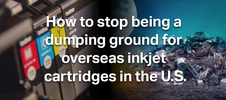
How to stop being a dumping ground for overseas inkjet cartridges in the U.S.
, by Kathleen Merz, 4 min reading time

, by Kathleen Merz, 4 min reading time
In the United States, there is no real oversight on imported inkjet printer cartridges. As cloned ink and toners flood the U.S. market at lower prices through online retailers such as Amazon and eBay, they effectively devalue many used OEM cartridges that were once being recycled - with consumers being left in the dark about what's going on.

The business of inkjet cartridges had been cleaner and self-sustaining, but it's gotten dirty again, and it's hurting all of us.
In the United States, there is no real oversight on imported inkjet printer cartridges. As cloned ink and toners flood the U.S. market at lower prices through online retailers such as Amazon and eBay, they effectively devalue many used OEM cartridges that were once being recycled - with consumers being left in the dark about what's going on.
In 1976, the inkjet printer was invented, but it took until 1988 for the inkjet to become a household item when HP released the DeskJet printer. From there, companies such as Canon, Epson, Lexmark, and Brother started to make affordable printers for homes and offices. This multibillion-dollar industry was built on the selling of consumable printer cartridges to the tune of 1.6 billion printer cartridges sold a year.
Unfortunately, the success of the desktop printer had a terrible side effect on the environment. Ink and toner cartridges created a massive plastic waste issue resulting in piles of printer cartridges ending up in our landfills. It can take 1,000 years for a single cartridge to decompose leaching toxins into the soil and groundwater.
This new waste issue gave rise to a whole new industry of ink and toner remanufacturing. These remanufacturers made up a new circular economy that could sustain itself. Printer cartridges that were once being thrown away could now be recycled for reuse at a lower cost to the consumer.

Empty or used printer cartridges had value. Companies like Staples, Office Depot and Best Buy started to take in used ink for recycling because it was good for their bottom line. They designed rewards programs to draw customers into the store to buy more OEM inks at a higher price point and sell the used ink cartridges to recyclers, who in turn sold them to remanufacturers.
Ink resellers, like Cartridge World, started popping up refilling or selling remanufactured inks at lower prices compared to the OEM printer cartridges. The circular economy of ink and toner cartridges was booming while at the same time keeping toxic plastics out of landfills.
Then, in early 2000, overseas manufacturers began to introduce 'clone' or generic printer cartridges into the market. Clone cartridges are just newly, cheaply created copies of OEM cartridges. This gave rise to lawsuits from the OEMs for patent and trademark infringements, but it didn’t stop the flow of these cartridges from entering the U.S. market.
Overseas manufacturers now promote their printer cartridges as compatible, remanufactured, or generic ink and toner cartridges. These cartridges are made of cheaper, contaminated material with very little quality control. As of June 2021, RT News had reported that the Netherlands planned to ban printer cartridges from China because of toxic materials found in the product.
Overseas compatible printer cartridges are single-use plastics that can’t be remanufactured or refilled. Unlike the OEM cartridges, there are no standards for compatible generic cartridges. It is cost-prohibitive to remanufacture multiple versions of a cartridge or compete on price when cartridges are being made so cheaply in overseas manufacturing facilities. This is killing that previously productive economic sphere.
The once-booming circular economy of ink and toner that prevented plastics from entering our landfills is now being threatened to go extinct. The U.S. is now facing another printer cartridge waste issue again, but this time it's because overseas compatible printer cartridge manufacturers are dumping cheap plastic cartridges into the country. Into our landfills.
What can consumers do? Stop buying compatible ink and toner cartridges. These cartridges are just polluting our country, and destroying U.S. businesses, and jobs. Recycle and buy remanufactured ink cartridges instead.
Saving money on ink doesn't have to come at such a high cost. If you want to save on price and still get quality as well as stop the inkjet cartridge plastic waste, buy U.S. remanufactured printer cartridges, such as those that DoorStepInk offers. DoorStepInk is remanufactured in the U.S. using only originally manufactured cartridges from HP, Canon, Epson, Dell, Brother, Lexmark, Collins, and Roland. Each cartridge is backed by a 100% satisfaction guarantee.
PLUS, DoorStepInk will recycle those used ink cartridges through their free mail-in recycling service. This way, we can all win with domestic remanufacture, jobs, economy, and regard to the environment. Visit www.DoorStepInk.com for details.

Do you have an organization that would benefit from fundraising? Learn about how we can help you raise funds for your cause while keeping inkjet cartridges out of the trash!

Plastic’s environmental footprint is shaped less by its existence and more by how long it stays useful. When plastics are kept in circulation—reused, remanufactured, and...

Environmental progress rarely comes from a single breakthrough or a one-time effort. It happens quietly, steadily, and often unnoticed—through consistent, repeatable actions carried out over...

Waste reduction goals aren’t achieved all at once. They’re reached through steady progress—one item diverted, one habit changed, one material kept out of the landfill....

Plastic waste doesn’t create its greatest harm right away. Its real impact unfolds slowly—over years and decades—as materials persist, accumulate, and spread through landfills, soil,...